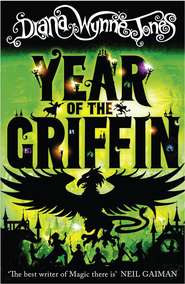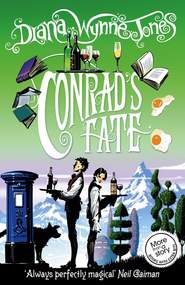По всем вопросам обращайтесь на: info@litportal.ru
(©) 2003-2024.
✖
Drowned Ammet
Настройки чтения
Размер шрифта
Высота строк
Поля
The very funniest thing happened when the calf had grown into a young and gamesome bull. Mitt and his parents were all in the pasture, trying to mend a place where the dyke bank was giving. The bull stood watching them, rather interested. Life was a little dull in the pasture. Then Hadd’s rent collector climbed over the fence and stalked irritably over to the dyke.
“I’ve been all the way to the house,” he said. “Why couldn’t you—?”
The bull, with a look of pure mischief in his merry red eye, lowered his horns and charged. He would not have dreamt of harming any of the family, but the rent collector was another matter. And in a misty, bullish way, he may have noticed that the family was not altogether pleased to see the rent collector. Anyway, up went the rent collector in a graceful arc, moneybag and all, and down he went again, moneybag and all, into the dyke, where he gave out a truly tremendous splash. He came up. He swore horribly. He floundered to the bank and tried to get out. The bull was there to meet him and simply prodded him back in again. It was the funniest thing Mitt had ever seen. It never occurred to the rent collector to cross the dyke and get out on the opposite bank where the bull could not reach him. He kept floundering up, clutching his moneybag. And prod, prod went the bull, and the rent collector was sitting in the dyke again. Over and over again, with the rent collector, floundering, reeling, sitting down splash, and squawking “Can’t one of you control this beast!” and Mitt’s parents leaning head to head, too helpless with laughter to do a thing about it. It was Mitt, laughing as hard as anyone, who at last hooked his finger in the ring on the bull’s nose and let the raging rent collector scramble out. And the rent collector was not pleased.
“I’ll teach you to laugh, boy!” he snarled.
He did. Next time he came for the rent, he asked double. When Mitt’s father protested, he said, “Nothing to do with me. Earl Hadd needs the money.”
Probably Hadd was short of money. The rents were put up all over the Flate. Rumour said that there were riots in the town of Holand, and the Earl needed to pay more soldiers to deal with the rioting. But only at Dyke End was the rent doubled. That was the rent collector’s private revenge. And there was nothing Mitt’s parents could do about it. Theoretically they could have gone to law and accused the rent collector of extortion. But the rent collector was the Earl’s official, and judges always upheld the Earl’s employees against ordinary people – unless, of course, you gave the judge a big enough bribe. Mitt’s parents had no money for bribes. They needed more than they had to pay the rent collector. They had to sell the bull.
Next quarter they sold the mule. Then some furniture. And by that time they were in a vicious circle: the more things they sold from the farm to pay the rent, the less they had to make money with to pay the next quarter’s rent, and the more things they had to sell. Mitt’s parents stopped laughing. That winter Mitt’s father took to spending most of the week away in the port of Holand, earning what money he could there, while Milda tried to run the farm with what help Mitt could give. It was desperately hard work. Milda’s pretty face acquired a seam of worry down one side – a sort of pucker where her dimple had been. Mitt hated that pucker. He did not remember how his father looked at that time. He remembered a curt, bitter voice and his father’s square back plodding away from them down the causeway to Holand to find work.
He could not have found much work. He spent longer and longer away in Holand, and brought very little money back, but what he did bring enabled them to drag on at Dyke End for the following summer. But Milda on her own was a poor, forgetful manager. Mitt did all he could to help, but they lost money steadily. There were still a few times when Mitt was able to lie on his back by the dyke, looking up at the rattling leaves, and think yearningly about his perfect land. As times grew harder, he seemed to want it more and more. He longed to set off again to find it, but of course he was older now and he knew he had to stay and help his mother.
Then quarter day came round again, and there was no money at all. It did no good for Milda to beg the rent collector to wait a day or so. He came back the next day with the bailiff and three of the Earl’s soldiers, and Mitt and Milda were turned out of Dyke End. A short while before Mitt’s sixth birthday, he helped his mother pack their few belongings into a handcart and push it into Holand to join his father.
(#ulink_c9cab024-26b2-5e33-8c69-d460a1d8ff32)
MITT ALWAYS HATED to remember that first winter in Holand. His father was living in one room in a big tenement block down by the harbour. Mitt and Milda joined him there. The tenement had perhaps once been the house of a wealthy man. Outside, on its greenish, peeling walls, there were the remains of pictures – once fine paintings of garlands of flowers and people out of stories, sheaves of wheat and bunches of fruit. But they were so old that Mitt could not quite tell what they were, and anyway, the inside of the building was what he saw most. The large rooms had been chopped into as many small ones as possible, so the house was crowded as full as it would hold of people. It was filthy. The buckets on the dark stairs stank. Bedbugs lived in all the walls. They came out at night and bit, viciously. What with that, and the strangeness, and the noise of all the people, Mitt could not sleep very well. He lay awake and listened to his parents quarrelling as they had never quarrelled before.
Mitt could not understand what the quarrels were about. It seemed as if his father was not pleased to have them with him in Holand. “Hanging round my neck!” he put it. He wanted them to go back to Dyke End. When Milda shrieked at him that there was no rent, he cursed her for laziness.
“Why should I work my fingers to the bone to keep you in idleness?” Milda screamed at him. But after a week of quarrelling, she found a job in a workroom which made fine embroidered hangings, and she was there, sewing, from early morning until light failed in the evening.
After this the quarrels Mitt’s parents had became even harder for Mitt to understand. His mother kept saying to his father, “You and your Free Holanders! Free Holanders! There’s no such thing as freedom in this place!” Mitt had no idea what that meant.
Mitt was shocked and shattered by the town of Holand itself. He hated the dirt and the noise and all the people. His job for the day was to carry their bucket to the waterfront and tip it in the harbour. As Milda said, the one advantage of living in that tenement was that you did not have to go far to get rid of your rubbish. Mitt hated the smell on the greasy waterfront, where fish scales glimmered on the flagstones like sequins on a dirty dress. The crowded harbour appalled him. There were tall ships with many masts and pennants flying, merchant ships, ships of the Earl’s fleet, loading and unloading going on most of the time. In between were small boats, packed and bustling, rowing boats, cutters, jollyboats and a good hundred fishing boats. Mitt was always glad when the fishing fleet sailed out, because the crowded water seemed a little emptier then.
After Mitt had brought the bucket back to the door of their room, he was all on his own once Milda had found work. He had nothing to do but keep out of the way of the other children. He hated them most of all. They were town children, shrewd, nimble and knowing. They made rings round Mitt. They jeered at him for not understanding town ways. They made him look a fool, then ran away laughing.
Mitt hid from them, usually, in the dark holes and corners of the house or the waterfront. But one day he felt he had had enough of that and ran away instead, up the hill from the harbour, into the better part of the town. Here, to his surprise, the streets were cleaner, and became wider and cleaner still as he went upwards. The air smelt almost fresh. There was a tang in it of the sea, and an autumn smell from the Flate. Better still, most of the houses were painted, and unlike the tenement, the paint was fresh and bright, and Mitt could see what the pictures were about. He walked slowly, looking at trees and fruit, red swirls and blue flowers, until he came to a particularly fine tall house, where the painting was in gold as well as other colours. On one gable, a stiff sort of lady in a green dress held out a very purple bunch of grapes to a stiff man on the other gable, whose hair seemed to be solid gold. Mitt much admired them. They reminded him a little of the figureheads on the fronts of the big ships. And perhaps because of the fresh air smell, they made him think of his perfect land.
He was standing lost in admiration and daydream when a servant of the merchant who owned the house came out with a stick and told him to be off. He called Mitt a guttersnipe and said he had no business to be there. Mitt ran away, terrified. As he went, he looked back and upwards. And there, on the very top of the hill, was the Earl’s palace, larger, whiter, brighter, and with more gold paint than any other house in Holand. Mitt felt it was squashing him. He felt like a pip in a cider press.
That was the last time for many years that Mitt remembered his perfect land. Holand quashed it out of his mind entirely and left him simply bewildered.
When Mitt’s birthday came, a few days later, and with it the Sea Festival, that was bewildering too. Everyone had a holiday, so there were more people about than ever. Mitt watched the Festival procession, hoisted on to the shoulders of a kindly man called Canden, who seemed to be a friend of his father’s. Down the street came a boiling and a bubbling of brightly clothed people. There was terrific shouting and yelling, and ribbons, fruit and flowers on everyone. Some had silly hats. Images went by on sticks – heads of cows and horses, with hats and ribbons on too. Big boys went tearing in and out of the procession, shouting and swirling wooden rattles. It was noise, noise, noise. Every so often came a group of people playing the traditional tune on traditional instruments. There were pipes called scarnels, which sounded just like their name, and triangular stringed things you played with a horsehair bow. They were cruddles, and they sounded just like their name too. And the groups of musicians were so far apart from one another that it was only by accident that they played the same part of the tune as the rest. Then, drub, drub, drub, came people banging at horsehair drums and drowning out even the scarnels. In the midst of it, Mitt glimpsed a straw dummy, fantastically looped with cherry-coloured ribbons, riding along in somebody’s arms.
“Look,” said the kindly Canden. “There’s Poor Old Ammet. That’s Earl Hadd carrying him.”
“What’s he going to do with him?” Mitt asked anxiously. He had never heard of Earl Hadd doing anything good with anything.
“Throw him in the harbour, of course. For luck,” explained Canden.
Mitt was horrified. Earl Hadd must be quite heartless. He thought of Poor Old Ammet being tipped into the harbour just like the bucket of muck Mitt tipped in daily, and Poor Old Ammet sinking, soaking, drowning, his ribbons getting spoilt. “Doesn’t he float?” he asked tensely.
“Not too often,” Canden said, quite unaware of Mitt’s state of mind. “Mostly he falls to pieces and sinks in the harbour or just outside it.”
“He doesn’t!” Mitt said frantically.
There was another friend of Mitt’s father’s standing beside Canden. He was called Dideo, and his face was a mass of tiny lines. Mitt thought Dideo’s eyes looked like two shiny fish caught in the net of his skin. Dideo said, “He doesn’t always fall to bits – Old Ammet. If the tide’s right, he goes out on the tide in one piece. Or they say he does. Floats for miles. And those in a boat that can find him and pick him out have a lucky boat ever after, they say.”
If anything, Mitt found it even more distressing to think of Poor Old Ammet floating, floating, all on his own out to sea. He tried to change the subject. “Who are those boys with rattles?”
Canden glanced at the procession, where boys in red and yellow trousers were having great fun whirling their rattles under the noses of cruddle players. “Boys from the Palace. All them in the procession come from the Palace,” he told Mitt, and turned to Dideo again. “I’ve never seen Old Ammet float. He goes down almost as quick as Libby Beer.”
“Would they let me run about with a rattle?” Mitt interrupted desperately.
“No. You’re born a nobody,” said Dideo. “He does float,” he said to Canden. “You’ve not been in Holand long enough to know, but he was picked up once, a good ten miles out, by the old Sevenfold, and I heard every man on that ship made a fortune afterwards. That was the only time I ever knew it happen, though,” he added regretfully. “I was about Mitt’s age at the time.” Here he looked up at Mitt and, finding him inexplicably white and tearful, nudged Canden.
Canden took Mitt down and peered at his face. “What’s the matter? Would you like an Ammet of your own?”
“No!” said Mitt.
Nevertheless, he arrived in front of a stall where dozens of tiny straw Ammets were for sale. With them came another friend of Mitt’s father’s, a man with a dour, blank face, called Siriol, who stood by without saying anything while Canden and Dideo bent over Mitt, doing their best to please him. Would Mitt have this Ammet here? Or how about this one with blue ribbons? And when Mitt firmly refused to have anything to do with Poor Old Ammet in any colour ribbons, Canden and Dideo tried to buy him a wax model of Libby Beer instead. But real and enticing though the wax fruit looked, Mitt did not want Libby either. She was thrown into the sea just like Poor Old Ammet. He burst into tears and pushed her away.
“But they’re lucky!” Canden said, quite mystified.
Dour-faced Siriol picked up one of the toffee apples from the other end of the stall and stuffed it into Mitt’s damp fist. “There,” he said. “That’ll please you best, you see.” He was quite right. Mitt forgot his distress, somewhat, in the difficulty of getting his teeth through the toffee into the apple underneath.
There was some mystery about these friends of Mitt’s father’s. Mitt knew his mother did not care for them. He heard her objecting to them every night when his parents quarrelled. Her objections seemed to mount steadily through that winter, until around the new year, when Mitt heard her say, “Oh, I give in! Only don’t blame me when the soldiers come for you!”
It must have been about a week after Milda said this, in the very heart of winter, when Mitt woke up suddenly in the middle of the night. A red light was flickering on the ceiling. He could hear crackling and distant shouting, and smell smoke. One of the big warehouses on the waterfront was clearly on fire. Mitt could see it, when he raised himself on one elbow, blazing into the sky and down into the dark water of the harbour. But what had woken Mitt was not that. It was the slow shuffling outside the door of the room. The sound made Mitt’s back prickle. He could hear Milda trying to light the lamp, whimpering with haste and annoyance because she could not get the wick to burn. Then the light came at last, and Mitt saw his father was not in the room. Milda ran through the room with the lamp, making lurching shadows as she ran, and tore open the door.
Canden was on the other side of it. He was clinging to the doorframe to hold himself up. Mitt could not see him well because Milda was holding the lamp all wrong, but he knew that Canden was either hurt or very ill, or both. He could see it in Canden’s face. He had a feeling that the part of Canden which was behind Milda and the doorpost was the wrong shape. It did not surprise him that Milda gave a dreadful strangled scream.
“Eeech! What—? I knew it would go wrong!”
“Harchad’s men,” said Canden. He sounded disgusted. “They were there waiting for us. Informers – that’s what they were. Dideo, Siriol and Ham. They informed on us.”
After that Canden gave a quiver of indignation and slid down the doorpost to the floor. Milda knelt down to him, hugging the lamp and whimpering. “O ye gods! What do I do? What can I do? Why doesn’t somebody help?”
After that doors began cautiously opening and shutting up and down the stairway. Ladies came in nightgowns and old coats, with more lamps or candles. There were troubled whispers and soothing words, while Milda rocked about on her knees, moaning. Mitt was too appalled to move. He did not want to look at Canden or his mother, so he lay and looked at the ceiling instead. The bustling ladies thought he was asleep, and after a while he must really have gone to sleep. Canden was not there in the morning. But he had been there. He had left a stain on the floor. And Mitt’s father was still not there either.
Mitt knew both of them were dead. Nobody told him, but he knew. What he did not know and wanted to be told was what had happened. He wanted to know why ladies in the tenement came and told Milda, “I should lie low, if I was you. You don’t want to get yourself arrested too.” Milda stayed away from work for a while, sitting very still by the window. Her face was so drawn in by worry that the seam where her dimple used to be looked more like a puckered scar than a line. Mitt hated her face like that. He crouched beside her feet and asked to be told what had caused it.
“You’re too young to understand,” said Milda.
“But I want to know,” said Mitt. “What’s happened to Dad?” He asked at least forty times before he got an answer.
“Dead,” said Milda. “At least, I hope that’s what he is, because they all say it’s better to be dead than have Harchad after you. And I shall never forgive them that did it to him – never, never, never!”
“What did Siriol and Dideo and Ham do?” Mitt prompted her.
“Leave me be, if you know so much!” Milda said irritably. But Mitt went on asking, and in the end Milda told him as much as she knew.
It seemed that when Mitt’s father had found it so hard to get work in Holand, he had felt so bitter against the Earl that he had joined a secret revolutionary society. There were a lot of them in Holand. The Earl’s son Harchad had spies and soldiers hunting out these societies night and day, at all times. But when he found one and marched the members off to be hanged, there was always another to take its place.











